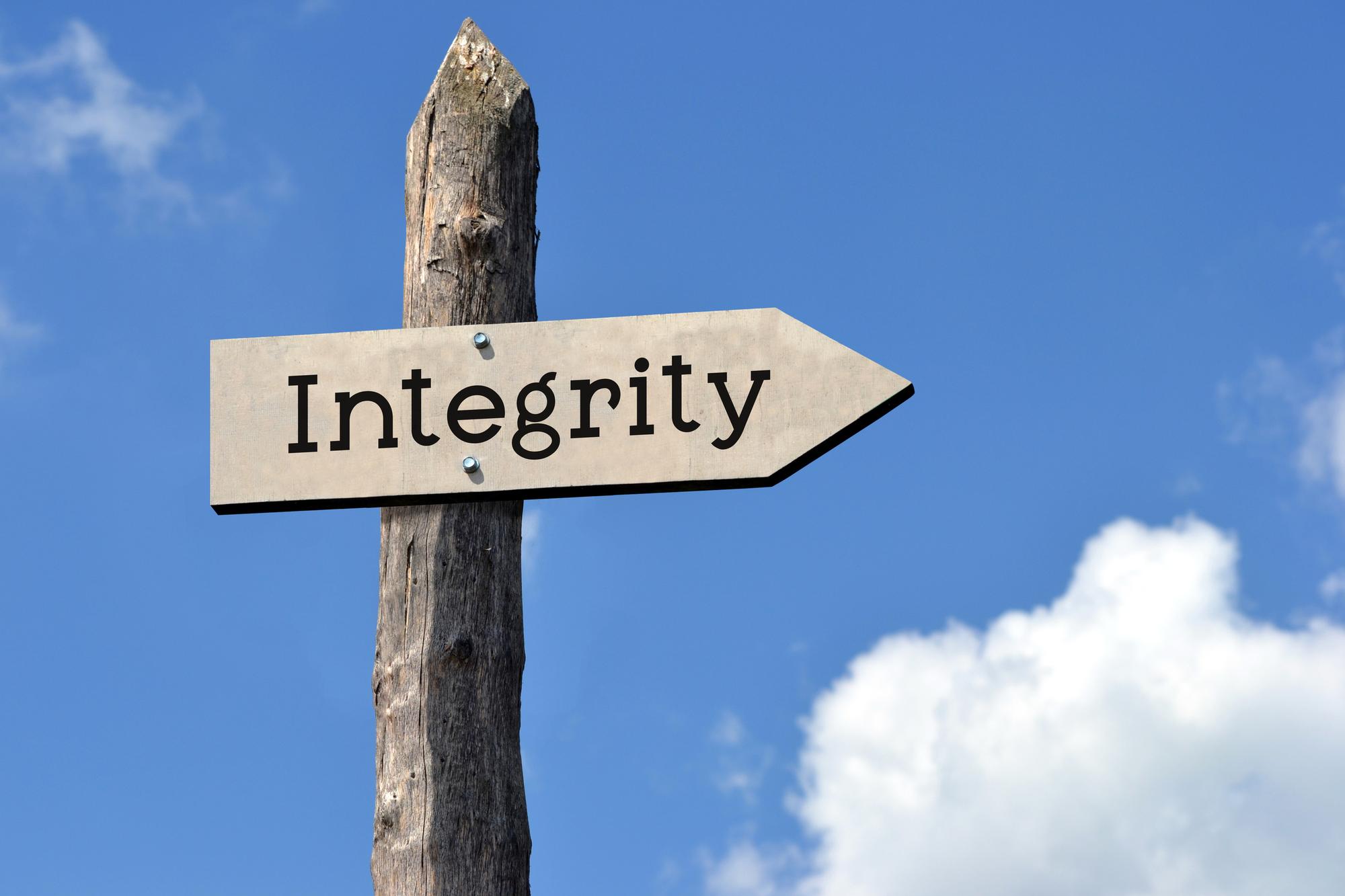The Crisis of Integrity
A lack of integrity is an epidemic that is drastically infecting America. Let us combat the onslaught and societal acceptance of deception as the norm, by being a people of impeccable integrity.

“The Adventures of Pinocchio is a classic children’s novel written by C. Collodi that first appeared in serial form in 1881 in the Giornale dei bambini (“Children’s Magazine”) and was published as a book in 1883. It tells the story of the little (wooden) marionette who wants to be a real boy, and it is perhaps the basis for the 1940 Disney film.
The Disney film is the best-known adaptation, though it is significantly different than the book, which is darker and portrays Pinocchio as more selfish and aggressive.”
In the story, Pinocchio is “cursed” with visible evidence when showing a lack of integrity, specifically lying, which causes his nose to grow. The crux of the story is his desire to become a real boy, but not until he learns many valuable lessons: disobedience does not pay, telling lies is not wise, and providing for one’s parents is beneficial. Wouldn’t it be a strange world if every time we practiced a lack of integrity our nose would grow. I’m afraid we’d be living in a society of huge “honkers.” However, it would be simple to confront sin, the obvious enlarged “snoz” would be a dead giveaway.
https://www.britannica.com/topic/The-Adventures-of-Pinocchio

The Josephson Institute for Ethics (Los Angeles) reports a survey of randomly selected High School seniors admitted to cheating on an exam at least once in the past year. Michael Josephson, founder of the Institute, stated in the report, "They're decent kids whose values are being corrupted by a world which is sanctioning stuff that even they know is wrong. But they can't understand why everybody allows them to take their lead from adults."
“According to a Harvard Crimson survey, 25% of the class of 2023 reported having cheated, including nearly one-fifth of those with 4.0 grade-point averages. This may underestimate the behavior. Respondents said they expected about half their classmates had cheated at some point during their studies.”
An ABC News Primetime broadcast on the Cheating Crisis in American Schools (2006) said, "The bottom line is that many students have more temptation—but they seem to have a whole new mindset." This "new mindset" was punctuated by interviews with college and High school students.
- "Cheating in School is a dress rehearsal for life." He mentioned current political and corporate scandals and inconsistencies in the court system. "Whether or not you did it or not, if you can get the jury to say that you're not guilty, you're free." (Will S., High School Senior).
- "A lot of people think it's like you're not there (in college) to learn anything. You're just learning to work the system" (Mary B., college student in the South). I added emphasis.
- "People will take other people's materials and pass it on as theirs. I'm numb to it already. I'll cheat to get by." (Joe G., a college student in the northeastern US).
The reasons students give for cheating vary but focus on the same general theme: success at all costs.
- "The pressure for good grades is high. Grades can determine your future, and if you fail this, then you're not going on to college, you're going to work at McDonald's and live out of a car" (Sam V., College freshman)
- "Everything is about the grade that you got in the class. Nobody looks at how you got it." (Post-Graduate Student currently employed in a top investment firm)
- "It's like moral relativity and cheating, in some situations and some cases, is perfectly OK. Why should I have to know about English literature? I shouldn't have to take this course. What good will it do? I'm going to be a doctor." (James V., medical student in New Jersey)
- "You don't want to be a dork and study for eight hours a day. You want to go out and have fun." (Pam S., college student in the South)
The Josephson Institute also surveyed over 4000 educators, and over half of them admitted to ignoring cheating at least once. Dr. Josephson concluded, "We are in a crisis of integrity, but it doesn't have to stay that way." This crisis of integrity is in epidemic proportions and has even infected Christian homes, churches, and schools. The Hebrew word for integrity means to be whole, sound, unimpaired, or entire. It is the absence of a double standard, deceit, and hypocrisy.
Don McCabe, professor at the Center for Academic Integrity at Rutgers University, states, "We need to promote integrity. We need to get students to understand why integrity is important—as opposed to policing dishonesty and then punishing that dishonesty."

What if we saw someone cheating? What do we do if we know someone has lied? What does the Bible instruct us to do to protect integrity? Remember that the heart of the matter is a matter of the heart.
Let's consider three options:
Option #1: We could do nothing.
Pretend we didn't see it. After all, we reason, God condemns sin, and He saw the person do wrong. He'll take care of it better than me. We'll just let it go and mind our own business. Since when are written and verbal rules violations, not a Christian's business?
What is my business as a believer? Does God know that I know? Did God allow me to know about it? Would God be pleased if I kept silent? Does God expect me to do something about it? Do I bear a responsibility to ensure that sin is dealt with in the lives of others?
These are all great questions and need to be answered. First, consider what Proverbs 17:15 says about my responsibility: "He that justifieth the wicked, and he that condemneth the just, even they both are abomination to the Lord." How do we "justify the wicked?" Justify means to declare or make to be correct. By inactivity and self-guided ignorance, we indirectly justify and declare right that which was wrong. Proverbs 28:4 says, "They that forsake the law praise the wicked." Did you read that? It says if we ignore and turn our back on the law of God, it is as if we applaud the wicked.
Doing nothing makes it easier to do nothing. In his Book on Leadership, John MacArthur states, "A defiled conscience, if tolerated or suppressed, makes real integrity impossible" (p. 80). This is a severe problem in our world today. Unfortunately, it has found a resting place in the most influential positions.
Doing nothing is the easiest way, but it is not the God-honoring way. Someone has said that "Silence is golden." However, in the case of righting a wrong, as they used to say of cowards in the old Westerns, in this case, "It's just plain yellow!" More importantly, our relationship with the Lord will be affected by doing nothing.
Option #2 We could notify an authority.
We could wait till the offending person is not around. Tell the authorities what you know they did. That seems sensible. After all, you did not let the situation pass, and there is a chance no one will ever know who reported them. But why should a person not get away with doing wrong in the first place? Because some rules were broken? No! The reason for dealing with the wrongdoing is that someone's integrity is in jeopardy—they need a right relationship with the Lord. You must be a faithful witness of what you saw, not only to guard your relationship with God but because you are motivated by love and concern for the one who has sinned.
There are a couple of concerns about choosing option two. How would the offending person feel if not confronted with the sin? They may believe that scripturally based rules are not applicable! They may surmise that they are an exception to the principle found in Galatians 6:7, "Whatsoever a man soweth that shall he also reap." They may conclude that the sin was not so bad in the first place because they did not get caught. This option may lead to greater risk-taking in the future and make it easier to sin in other areas.
Another problem with choosing option two is paranoia. By not being personally confronted with the sin, the offender may wonder who saw or reported it. The normal fleshly reaction may be to seek revenge, make excuses by pointing out the weaknesses in others, or begin to shift blame. Instead of confession of the sin, their perceived carelessness may lead to becoming suspicious and being more cautious.
We must also consider that the authority may question the motive of the one reporting the incident. Are you just trying to get someone in trouble? Do you have a vendetta toward this person? How can a person who sinned feel anything but bitterness because he got caught? This may make the individual decide to be more careful next time or wish they knew the creep who turned them in. The law of the godless is to never tell on anyone. Author C.S. Lewis indicated that man tends to become "a more clever devil" without proper Christian instruction.
To mature as a Christian, we must take ownership of our decisions. When we choose to sin, we must own it and take responsibility for our actions. Being a substitute conscience never helps anyone. Option number two may be easier and less risky, but there are better options than this one when someone's integrity is at stake.
The Christian motive must be to help the other person take responsibility for their actions. Everyone must settle their own sin account with God first, then with man. We must convey the principle that when someone tells you the hard truth, they are not your enemy but your friend. In Galatians 4, the apostle Paul confronted the Galatians for practicing legalism and adding to the gospel. He counters this practice by expressing the liberty that believers have in Christ. Following Paul's admonitions would require a significant change in their philosophy, lives, and way of life. Paul said in Galatians 4:16, "Am I therefore become your enemy because I tell you the truth?"
Option #3: We can go to them!
This option is the Biblical option. Let us first remember that the goal of confrontation is restoration, not destruction. Two primary passages will be referenced with this option.
Galatians 6:1: "Brethren, if a man be overtaken in a fault, ye which are spiritual, restore such a one in the spirit of meekness; considering thyself, lest thou also be tempted." This verse places the responsibility of restoration on the spiritually minded believer. The spiritual one always bears the burden of bridge-building. The word, restore, is a medical term for setting a broken bone with tenderness and care. If done correctly, the mending will be strong and less likely to be broken there again. Restoration should always come from a gracious, loving, vulnerable perspective, never from a pious, condescending attitude.
The second passage is found in Matthew 18. 15-17 “Moreover if thy brother shall trespass against thee, go and tell him about his fault between thee and him alone: if he shall hear thee, thou hast gained thy brother. But if he will not hear thee, then take with thee one or two more, that in the mouth of two or three witnesses every word may be established. And if he shall neglect to hear them, tell it unto the church: but if he neglect to hear the church, let him be unto thee as an heathen man and a publican."
Pastor Jerrod Rumley of Shadowbrook Church near Atlanta, GA, gives steps to consider in confrontation from the Matthew 18 passage:
Step 1: Go to the offender privately and alone, one-on-one. Out of respect, this should be the first person you talk to, not a friend or small group. Be in much prayer and wait for the right mindset before confronting a brother or sister in Christ. There are three rights to consider: the right time, the right words, and the right place. Pastor Rumley reminds us not to "lose sight of the mercy you were shown in Jesus. Don't forget the moment you experienced God's grace and know He is using you to be that bearer of grace in someone's life."
Step 2: Take others with you. When a believer sins, the stakes are high; the reputation of Jesus is at stake. If the one-on-one conflict resolution fails, the Bible instructs that we must expand the circle. Take one or two others as witnesses rather than as additional counselors or backup. These individuals need to share the confidential matter that is being discussed. It is not an attempt to spread gossip. The next step is to bring them before the body of believers to make the matter known. This is where sin should be confronted with great care.
Step 3: Remember to display Jesus: Even if the confrontation is rejected, remember Jesus still loved those who rejected Him and refused to listen to His words. Romans 12:18 says, "If it be possible, as much as lieth in you, live peaceably with all men." You do your part and trust God to work behind the scenes.
When choosing option three, your mindset and process should be to:
- Tell them what you saw.
- Take responsibility for their actions before God and others.
- Please encourage them to go to the authority (offer to go with them).
- Give a time limit before you are responsible for making it known.
- Follow up with them privately.
Why does this option seem so difficult for Christians to follow? First, it makes us vulnerable, wide open to ridicule and retaliation. This option does require risk. We become fair game to pointed hatred. Proverbs 15:12 states, "A scorner loveth not one who reproveth him, neither will he go to the wise."
What possible good can come from choosing option three? The fellow believer may realize that someone has enough concern for him to confront him in his sin. He will be forced to go through the motions of taking responsibility for his wrongdoing. If he is an authentic Christian, he has been convicted of the sin, and your encouragement may be all it takes to make the right decision. Proverbs 9:9 says, "Give instruction to a wise man, and he will be yet wiser; teach a just man, and he will increase in learning."
According to Matthew 18:15, if the person who is confronted will accept the admonition and realize the heart of the Christian, you will “gain a brother.” Once again, the Scripture indicates restoration as the ultimate goal of a necessary confrontation.
In the early days of my ministry, I served as a Youth Director in my home church. The first activity that I organized was to have the youth group meet on a Saturday, read letters from missionaries, pray for them, and then write letters back to them as a means of encouragement. Of course, the activity included a fierce tournament of dodgeball and lots of pizza. As the young people were gathered in the lunchroom area, they began to get involved in this outreach activity, Mr. W, the church’s custodian, came into the room and demanded that we leave. I tried to talk to him, but he would not let me speak. He was very clear. I and the group must leave the premises. He said that “I was costing the church money by having all the gym lights on, the AC running, and occupying the entire lunchroom with just a “handful” of kids.” He even became so adamant that he threatened to call a deacon or the Pastor to get me to leave. To preserve my dignity in front of the young people, I quietly told the teens that we had to leave and would try to get together soon.
As I stood in the parking lot, watching students depart, my flesh began to boil. I felt embarrassed and disrespected in front of the youth group. “How dare he treat me like that,” I said to my wife. When I got home, I immediately called the Pastor to have him make things right with this man. As I explained (in too many details) how I was treated, Pastor just listened. Then he said, “You know what you need to do? Right? You need to confront him and tell him how you were offended.” That was not what I wanted to hear. I wanted Pastor to call Mr. W and ream him out, tell him off, set him straight, come to my defense! I wanted the Pastor to intervene on my behalf.
Pastor was right, I had to swallow my pride, humble myself, and muster the courage to face Mr. W alone face-to-face.
On Monday, I went to the back of the church to Mr. W’s maintenance room. I stuck my head in the room and saw Mr. W working on a broken vacuum cleaner. I asked if I could speak to him for a few minutes. He said sure. In humility, I asked for his forgiveness for what happened on Saturday afternoon. Then I explained that I was approved by the Pastor and deacons to begin working with the youth group. I told him what I was doing and why I was doing it. He began to weep. He had no idea. He was trying to protect the ministry and save money. He was devastated, knowing that he was responsible for interfering with the ministry of encouraging missionaries. He begged for my forgiveness and offered to meet with the teens and ask them to forgive him as well. He did that at the next youth group meeting.
I gained a brother. For every youth activity from that point on, Mr. W was my greatest supporter and helper. He would come to me and ask if I needed anything or needed anything picked up in the area. One Christmas, my wife and I did not have the funds to fly from North Carolina to Arizona to visit her parents. At lunch one day in December, Mr. W handed me an envelope with the cash I needed for airline tickets.
Had I responded in pride and arrogance, great harm would have come to the ministry of the church and the Kingdom of God. To this day, many of those former young people talk of the great example and friend that Mr. W was to them. Handling things God’s way made a difference in eternity.
Conclusion:
Option 1: Doing nothing is the easiest and least intrusive, with little to no risk.
Option 2: Telling the authority is easy and close to the right choice, yet it is not Biblical and creates paranoia without risk.
However, the easiest is not necessarily the best.
Option 3: Going to the person requires courage, genuine love, and vulnerability. 1 Peter 4:8, "And above all things have fervent love for one another, for love will cover a multitude of sins."
A lack of integrity is an epidemic that is drastically infecting America. We are bombarded with fake news, misrepresentations, political corruption, and persuasive deceitfulness. As Isaiah 59:14 declares, “Truth has fallen in the streets.” It is difficult to trust anyone or anything anymore. Someone recently shared this statement about the lack of integrity that characterizes our culture, “If someone tells you what time it is, you still look at your watch.” Let us combat the onslaught and societal acceptance of deception as the norm, by being a people of impeccable integrity. Proverbs 16:20 gives us this promise, "He that handleth a matter wisely shall find good: and whoso trusteth in the Lord, happy is he."

Eddie Riley
Eddie Riley is the ADMINISTRATOR, SENIOR BIBLE Instructor for Cross Lanes Christian School, and has served in this position since 2013. He has faithfully ministered in Christian Education for over 40 years at schools in NC, AZ, FL, VA, NJ, and WV. Eddie holds a BA in Bible from Bob Jones University, and M.Ed. from West Coast Baptist College
















